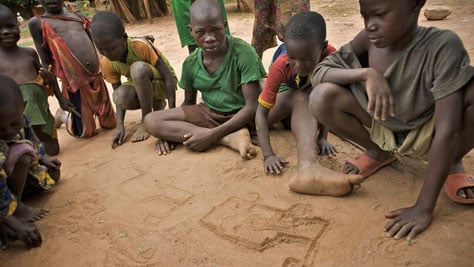Children drawing tanks in the sand in front of a school in Patcho, near Kaga-Bandoro, Central African Republic. Attacks by armed groups, banditry and inter-communal tensions in the country have had a devastating impact on the civilian population, especially children.
A new report has found that many countries failed to include children’s health and well-being in their national adaptation policies.
The report, co-authored by nine medical scientists, was released on Tuesday by The Lancet, a medical journal.
The report found that among the 160 countries analysed, 44 (28%) failed to include any child-related domain.
The report said 49 (31%) of the countries included at least one child-related domain, while 62 (39%) included between two and six domains.
Advertisement
It added that only five (3%) countries included at least seven domains.
“No country’s policy presents a comprehensive view of child health as it relates to adaptation across identified domains,” the report reads.
“More than a quarter of the countries — 44 (28%) — had policies that included no child-specific measures.
Advertisement
“At the other end of the spectrum, fewer countries (five [3%]; i.e., Austria, Jordan, Samoa, Sudan, and Timor-Leste) included text linking from seven to ten child-specific domains.
“Most countries (111 [69%]) mention between one and six child-specific domains.”
The report identified Sudan as the top scorer in adopting child-specific policies in its adaptation theme.
“Sudan is the top-scoring country, having adopted a wide range of child-specific adaptation themes within their national adaptation policy,” it said.
Advertisement
“In light of contemporary theories of childhood, recognising children as a diverse group with varying ages, genders, agencies, and social roles is essential for effective policies linking health and climate change.
“Acknowledging all caregivers and children as active agents and co-creators of their environment, involving them in policy planning, and listening to their voices is equally crucial to addressing climate change policy development for health.“
Add a comment






